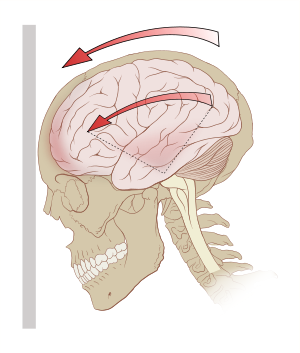
Concussion

Concussion, also known as mild traumatic brain injury (mTBI), is typically defined as a head injury that temporarily affects brain functioning. Symptoms may include loss of consciousness (LOC); memory loss; headaches; difficulty with thinking, concentration or balance; nausea; blurred vision; sleep disturbances; and mood changes. Any of these symptoms may begin immediately, or appear days after the injury, and it is not unusual for symptoms to last four weeks. Fewer than 10% of sports-related concussions among children are associated with loss of consciousness. Common causes include motor vehicle collisions, falls, sports injuries and bicycle accidents. Risk factors include drinking alcohol. The mechanism may involve either a direct blow to the head or forces elsewhere on the body that are transmitted to the head. This is believed to result in neuron dysfunction, as there is increased glucose requirements but insufficient blood supply. Diagnosis requires less than 30 minutes of LOC, memory loss of less than 24 hours, and a Glasgow coma scale score of 13 to 15. Otherwise, it is considered a moderate or severe traumatic brain injury. Prevention of concussions includes the use of a helmet when bicycling or motorbiking. Treatment generally involves physical and cognitive rest for a day or two, with a gradual return to activities. Prolonged periods of rest may worsen outcomes. Paracetamol (acetaminophen) or NSAIDs may be recommended to help with a headache. Physiotherapy may be useful for persistent balance problems; cognitive behavioral therapy may be useful for mood changes. Evidence to support the use of hyperbaric oxygen therapy and chiropractic therapy is lacking. Concussions are estimated to affect more than 6 per 1,000 people a year. It is the most common type of TBI. Males and young adults are most commonly affected. Outcomes are generally good. Another concussion before the symptoms of a prior concussion have resolved is associated with worse outcomes. Repeated concussions may also increase the risk in later life of chronic traumatic encephalopathy, Parkinson's disease and depression. Concussions are associated with a variety of symptoms, which typically occur rapidly after the injury. Early symptoms usually subside within days or weeks. The number and type of symptoms any one individual suffer varies widely. Headaches are the most common mTBI symptom. Others include dizziness, vomiting, nausea, lack of motor coordination, difficulty balancing, or other problems with movement or sensation. Visual symptoms include light sensitivity, seeing bright lights, blurred vision, and double vision. Tinnitus, or a ringing in the ears, is also commonly reported. In one in about seventy concussions, concussive convulsions occur, but seizures that take place during or immediately after a concussion are not 'post-traumatic seizures', and, unlike post-traumatic seizures, are not predictive of post-traumatic epilepsy, which requires some form of structural brain damage, not just a momentary disruption in normal brain functioning. Concussive convulsions are thought to result from temporary loss or inhibition of motor function and are not associated either with epilepsy or with more serious structural damage. They are not associated with any particular sequelae and have the same high rate of favorable outcomes as concussions without convulsions. Cognitive symptoms include confusion, disorientation, and difficulty focusing attention. Loss of consciousness may occur, but is not necessarily correlated with the severity of the concussion if it is brief. Post-traumatic amnesia, in which events following the injury cannot be recalled, is a hallmark of concussions. Confusion, another concussion hallmark, may be present immediately or may develop over several minutes. A person may repeat the same questions, be slow to respond to questions or directions, have a vacant stare, or have slurred or incoherent speech. Other MTBI symptoms include changes in sleeping patterns and difficulty with reasoning, concentrating, and performing everyday activities. A concussion can result in changes in mood including crankiness, loss of interest in favorite activities or items, tearfulness, and displays of emotion that are inappropriate to the situation. Common symptoms in concussed children include restlessness, lethargy, and irritability.
